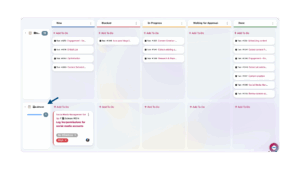Estimated reading time: 5 minutes
Table of contents
- Better Planning and Organization
- Increased Efficiency and Productivity
- Improved Communication and Collaboration
- Better Cost Control
- Enhanced Decision Making
- Improved Stakeholder Engagement
- Improved Customer Satisfaction
- Better Risk Management
- Better Project Delivery
- Improved Team Morale
- Project Management Is for More Than Engineers
Project management is a crucial component in successfully completing an initiative or goal. While the concept (project management) often sounds vague and elusive (so many ways to do it!), project management is the process of envisioning your goal and laying out the map to get to it. The more complex the path to the goal is, the more likely you will need more robust project management.
Managing a project, then, should encompass all the processes and activities required to plan, execute, and close a project successfully. From defining the project scope and objectives, to allocating resources and monitoring progress, project management is an essential activity for ensuring that projects are delivered on time, within budget, and to the required quality standards.
The Benefits of Project Management
Here are some of the key reasons why project management is so important and how it’ll improve your work:
Better Planning and Organization
The start of any project should include proofing the idea/goal/initiative — project management tools often skip this or assume we’re manage it elsewhere — and as you proof, you’ll begin to plan and create a better understand and framework for that project. The more you know & understand, the more you can stay focused and deliberate in the work. Then as you organize that information into digestible tidbits for the team, you create a mutual understanding of the why.
This approach empowers teams to be able to use their knowledge to help you catch holes, risks, and potential problems and mitigate them before they can impact the project.
Increased Efficiency and Productivity
Streamlined focus from your improved planning and organization will then begin to help your processes become smoother and increase the team’s efficiency. Using project planning to clearly define roles and responsibilities and ultimately setting clear timelines and deadlines. This helps to minimize waste and reduce the time required to complete tasks — which in turn increases overall productivity and helps to deliver projects faster.
Improved Communication and Collaboration
Effective project management will include keeping everyone up to date on the project status and ultimately help to foster better communication and collaboration among team members — thus ensuring that everyone is aware of their responsibilities and the project timeline. It can also help make your communications more clear to stakeholders because you’ll quickly know where things are in status. Good project management also helps to promote transparency and accountability by keeping everyone on the same page.
Better Cost Control
The more insight you have into your projects, the easier it gets to account for waste that can occur, to mitigate risks and prevent delays and to help manage time tracking. Project management then helps to ensure that projects are delivered within budget; by monitoring and controlling costs throughout the project lifecycle. This helps to avoid overspending and minimize waste, and ensures that the project remains financially viable.
Enhanced Decision Making
When you understand the ‘why’ and purpose of a project, as mentioned earlier, you can cling to that laser focus. Keeping focused mitigates “shiny object syndrome” and leads to better decision making — coupled with project management providing clear and up-to-date information about the project status, progress, and any risks or issues. This helps to ensure that decisions are informed and well-informed, and that any potential problems are identified and addressed early on.
Improved Stakeholder Engagement
Project management helps to ensure that stakeholders are engaged and informed throughout the project lifecycle. You then have the ability to quickly relay and answer questions that the stakeholders may have and give them better support to help make decisions around the projects.
Improved Customer Satisfaction
Working with clients? Using project management to launch the next greatest latest product? When your projects are delivered in good quality, on budget and as promised… the outcome is satisfied customers. Make this a repeatable process and you’ll quickly build and establish trust and confidence with your user. Satisfied customers also gives your project team a visible value point to the hard work they’re doing.
Better Risk Management
Project management helps to identify and mitigate risks, by putting in place processes and procedures for monitoring and controlling risks throughout the project lifecycle. This helps to minimize the impact of risks on the project and ensures that any potential problems are dealt with before they become major issues.
Better Project Delivery
Maybe a bit on the obvious side but project management makes project delivery more likely.
One of the goals of project management is to ensure that projects are delivered on time, within budget, and to the required quality standards.
Improved Team Morale
Project management helps to foster a positive and collaborative work environment, by ensuring that everyone is aware of their responsibilities and the project timeline. Good project management also helps to promote transparency and accountability — as mentioned above, as everyone understands the why and feels like they are contributing & creating value, it makes the overall workflow that much better.
Project Management Is for More Than Engineers
Since the old days of waterfall and now the current days of agile, project management is often thought of as a construction or as an engineering concept. This isn’t the case; we all use project management in some capacity when we have a goal — at work or at home.
Project management is intended to make getting to those goals easier, quicker, and repeatable in efficiency. It makes businesses more successful by creating focus and by aligning people on the work and purpose.
In conclusion, project management is an essential skill for delivering successful projects. It helps to improve planning and organization, increase efficiency and productivity, and ensure that projects are delivered on time, within budget, and to the required quality standards. Whether you are a project manager or part of a project team, developing your project management skills will help you to deliver better results and achieve greater success.
Looking for an easy project management system that won’t break the bank in dollars or hours? We’ve got you covered with Leantime. Learn more about our features and how we do project management differently and get started with a free account.

Some other articles and pages you might be interested in:






